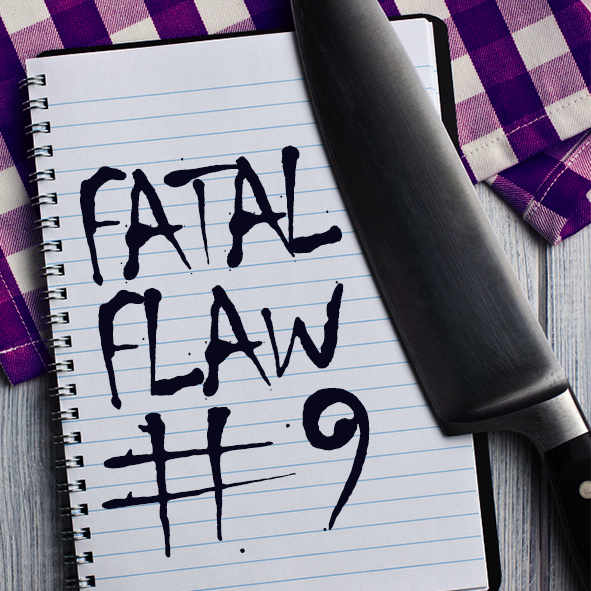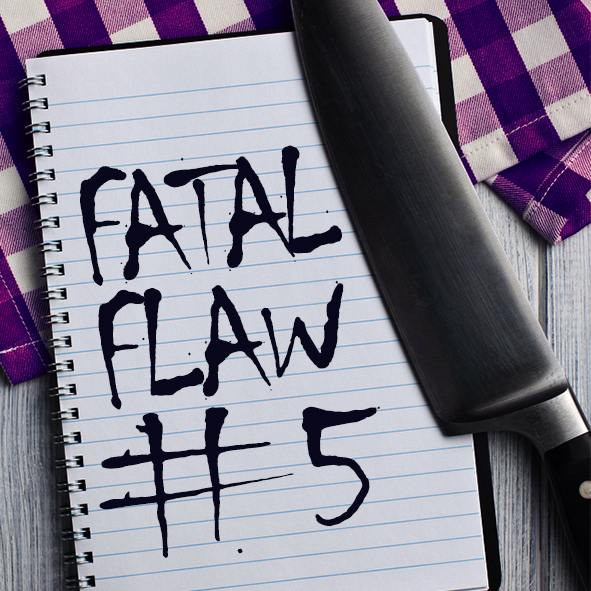Telling the Whole Story: Fiction and the Problem of Underwriting
This month our editors are going to tackle Fatal Flaw #9—Underwriting. We looked at the perils of overwriting early in the year, but “underwriting” is another problematic area for novelists. Too often necessary information is left out of a scene, leaving readers scratching their heads. This may pertain to narrative, dialog, setting—every and any component found in fiction. Today editor Rachel Scott Thomson kicks off our look at underwriting by exploring the problems with sketchy writing.
Modern writers have been heavily influenced by the movies. On the one hand this is good—the best of visual media will teach us pacing, plotting, great dialog, and hopefully the mechanics of a good setting.
But books are not movies, they are not TV, and getting our training from them can sometimes lead us to forget something:
Our stories are invisible.
A great deal is said about the dangers of overwriting. In fact, we’ve discussed many of those dangers in this series: in backstory, dialog, action, and more. Under the banner of “Show, don’t tell,” we’ve demonstrated ways to cut back your prose so the story comes leaping to life.
But the “don’t tell” rule does not mean that essential elements of a story should be left out. Readers translate the words we write into images, feelings, voices, etc. If we don’t actually put those words on the page, there’s nothing to translate—nothing to bring our stories to life.
That’s the danger of underwriting, and for beginning writers, it’s nearly as common as its opposite.
The Trouble with Underwriting
Because we already know exactly what’s in our inner “movie,” we can fail to realize that not everything is making it onto the screen. The constant refrain of “don’t overwrite,” while valid in itself, can cause writers to tighten back even further and actually leave things on the cutting floor that should have stayed in.
It’s possible to underwrite setting, action, characterization, logic, emotion, process, and more. Our editors will discuss many of these throughout this month. The results can be so jarring that a reader is totally kicked out of the scene—or fails to enter it fully in the first place.
When a character starts talking and you didn’t know they were in the scene? Underwriting. When someone starts the scene in her bedroom and ends it in the office and you didn’t know she had moved? Underwriting. When someone makes a decision and you have absolutely no idea why?
Yeah, that’s underwriting too.
To demonstrate, I want to share two versions of two passages from my whimsical fantasy Lady Moon. One majors on action, the other on dialog. The Before passages are significantly underwritten. The After passages solve that problem.
BEFORE (DIALOG):
Celine was still languishing when a wild head popped out. “Do me a good turn,” it said with a friendly smile. “Marry me? It would get us out of here. You and I, as husband and wife. I say, what are you looking for?”
“Something heavy,” she answered.
“What for?” it asked.
“To pitch it at you,” she answered.
“You’d miss,” the head said cheerily. “Now don’t look angry. You want something—I can see it in your eyes.”
“I do,” said she. “An older brother. Or—growing reflective—“a dog. You deserve to have something set on you.” Her slender fingers ached for the lack of anything to throw.
A sudden racket of moving pebbles and shifting limbs was accompanied by a cloud of dust from above. The man dropped through the hole.
AFTER (DIALOG):
Celine languished six and thirty days in a cavern on the moon, where her uncle had unceremoniously tossed her. She had been in the habit of throwing her scrub brushes at his head whenever he poked it through the door of the Great Hall, and the last time she’d done it, he’d taken a fit of temper and had her sent—through whatever nefarious means he had at hand—to a place of such height, such distance, and such golden-white loneliness that no scrub brush could ever descend from its bitter reaches, hurled by ever such a temper.
She was still languishing with all her might and main when a wild head popped out of a smallish hole in the ceiling of the cavern. “Do me a good turn,” it said with a friendly smile. “Marry me?”
Instinctively she looked for a scrub brush to pitch in the head’s direction, but as nothing came to hand, she listened to it. It seemed determined to talk.
“It would get us out of here,” the head told her. “You and I, as husband and wife. I say, what are you looking for?”
“Something heavy,” she answered.
“What for?” it asked.
“To pitch it at you,” she answered.
“You’d miss,” the head said cheerily. “Now don’t look angry. You want something—I can see it in your eyes.”
“I do,” said she. “An older brother. Or”—growing reflective—“a dog. You deserve to have something set on you.” Her slender fingers ached for the lack of anything to throw.
A sudden racket of moving pebbles and shifting limbs was accompanied by a cloud of dust from above. The head was attached to a man—she had suspected so all along—and it proved as much by dropping through the hole, followed by the other necessary parts, into the cavern where she had up until now thought herself alone.
What Was Missing. This is the opening scene in the novel. The Before passage is missing several really key elements—elements that help us make sense of the entire scene. The setting is the most important. (A wild head popped out of where? Wait, now someone is dropping through the ceiling? Where did the pebbles come from—isn’t she in a house or something? Why does it have a hole in it?)
Second in importance are the missing background details, which let us know both why Celine is “languishing” and also why her first reaction is to look for something to throw. The opening paragraph in the After version gives us keys to the situation and to Celine’s personality. It also sets the genre: knowing how Celine got here moves this scene out of the real world and into whimsy.
BEFORE (ACTION):
“Stand back,” Sir Brian said. He swung his battle-axe. Tereska rushed forward.
“The axe rebounded,” he said. “There’s something else blocking the way.”
She let out a noise that might have been a curse. “Umbria’s spell,” she said.
“We’re trapped?”
“We’re not going back,” Tereska growled. She shoved Thomas’s sword in farther and then tried to move the blade. It didn’t want to budge. It felt as though she’d plunged it into a block of hardening molasses.
Tereska went right through with the rest of the sword. For a moment she thought it would squeeze the life out of her. She tried to gasp, but couldn’t; where air had been, there was nothing now but a heavy, fuzzy pressure.
In the next moment she popped out the other side. Through her blurry eyes she saw the others pitch themselves from the wall and land in disarray around her.
“Ouch,” she heard Sir Brian mutter. “That’s going to leave a dent.”
AFTER (ACTION):
“Stand back,” Sir Brian said. He swung his battle-axe and brought it into the door. The door shattered, and pieces of wood flew in every direction. Tereska rushed forward, but Sir Brian stopped her with his arm.
“The axe rebounded,” he said. “There’s something else blocking the way.”
Gingerly, Tereska reached out. Her fingers touched something invisible, spongy, and warm. She let out a noise that might have been a curse. “Umbria’s spell,” she said.
“We’re trapped?” came Aldon’s voice from the rear.
“We’re not going back,” Tereska growled. She reached inside her cloak and pulled Tomas’s golden sword out once again. It had sliced through a magical seal once. It could do it again.
Tereska thrust the sword straight forward. The tip went through the thick magic, half-burying the blade while the free end quivered. Tereska shoved it in farther and then tried to move the blade. It didn’t want to budge. It felt as though she’d plunged it into a block of hardening molasses.
But when a woman is attempting to rescue herself, her revolution, and a big man in armor who insists on calling her “my lady” from the cruel appetites of Ravening Fire, that woman does not allow magical molasses to stand in her way. Tereska grabbed the hilt with both hands, let out a war scream that would have curdled milk, lowered her head, and charged.
The sword went the rest of the way through the magic, and Tereska went right through with it. For a moment she thought it would squeeze the life out of her. She tried to gasp, but couldn’t; where air had been, there was nothing now but a heavy, fuzzy pressure.
In the next moment she popped out the other side, fell six feet to the ground, and lay gasping for breath on the greensward. Through her blurry eyes she saw the others pitch themselves from the wall and land in disarray around her.
“Ouch,” she heard Sir Brian mutter. “That’s going to leave a dent.”
What Was Missing. This, I think, is pretty obvious: if you could follow the action in the Before paragraph at all, you deserve an award! In fact, the missing information could lead to misunderstanding: are Sir Brian and Tereska on the same side, or are they fighting in that opening line? Who asks about being trapped? Setting, motivation, and key actions are all absent.
A caveat here: certain actions are a natural chain and don’t need to be spelled out. I can write “I picked up the keys,” and you’ll get a clear picture of what I’m doing; I don’t need to write “I reached out, uncurled my fingers, closed then around the keys, and lifted them.” But where action isn’t a natural chain, the steps need to be there.
In a story like Lady Moon—where magic is involved and nothing is really what we expect—it’s even more important than normal to make sure everything is in place. But this is important in a “real world” story as well. Note that intangibles are also important: reasoning, logic, motivation, emotion. These connect the dots between actions, showing us why people are doing what they’re doing.
When a story is underwritten, everything suffers. POV is weaker; personality and perception don’t come through. Confusion reigns when it comes to action; settings are vague or even baffling.
In balanced writing—neither overwritten nor underwritten—the story becomes a true approximation of the human experience, even when it’s a madcap fantasy romp in which people are banished to the moon. “A good book,” wrote novelist William Styron, “should leave you slightly exhausted at the end. You live several lives while reading it.”
Don’t shortchange your writing. Connect the dots, fill out the setting, and even “tell” us the history. Give us the pieces we need to translate the invisible into a story we can truly live.
Your turn:
What important things do you want to read about in novel scenes that fill in the story for you? What do you notice is missing in some of the books you read that shows a lack of heart? Does this exploration of underlaying help you?











This is another great post. Thank you!
Yes, another helpful article. The element I often find missing in fiction is the use of the senses: smells, touch, sounds. I find the use of sense elements grounds me into the protagonist or narrator’s POV, and adds an extra dose of realism to the place of action.
Very helpful article, and your examples were spot on. Thank you.
Been sharing this post to various friends and in comments on several threads. Nice to see the idea of underwriting as important a problem as overwriting. And with super examples to boot, thanks! 🙂